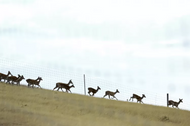Exploring 5 Varieties of Deer Fencing: A Guide to Making the Right Choice
Posted by Shelby Carlson on 29th Sep 2023
Deer fencing is an essential aspect of safeguarding your garden, maintaining a tick-free environment, and deterring deer from encroaching on your property. While planting shrubs and perennials that deer find unappealing can help, it's not foolproof in keeping these animals at bay. They can trample your plants and potentially bring ticks that carry diseases.
Fortunately, you don't have to rely solely on deer-resistant plants or harsh tick repellents. A variety of deer fencing options are available that help protect your plants, reduce the need for chemicals, and can even contain your pets within your yard. This article delves into the different types of deer fencing and repellents available for your outdoor area.
Factors to Consider When Selecting Deer Fencing
When picking out deer fencing, consider the following aspects:
1.Metal Wire Fencing
Comprising heavy-gauge metal wires running in both directions to form rectangles, metal wire fencing is a cost-effective and popular choice among gardeners compared to standard yard fencing. Installation is straightforward: you hammer metal posts (or install more robust wooden ones) into the ground, then attach the wire to each post. This type of deer fencing has long been a favorite for gardeners and farmers due to its durability when the posts are properly installed. High-quality products, like metal wire deer fences coated in black polyethylene, offer better weather resistance and are less noticeable than standard silver wire options.
Consider giving your garden the ultimate protection against deer with DeerBusters' PVC-coated welded wire mesh. This high-quality, durable fencing solution offers exceptional resistance to weather, making it an excellent long-term investment for your garden. Get peace of mind knowing that your plants are safe from deer and other pests. Make the smart choice for your garden today. Visit DeerBusters to explore your options and purchase.
2.Polypropylene Mesh Fencing
Polypropylene mesh fencing, a plastic barrier attached to vertical posts, is the most budget-friendly option. However, it may not be as visually appealing as other alternatives if not properly installed. A tight installation rather than loose can make it look more like conventional fencing. Remember that deer are strong creatures capable of breaking weak plastic fencing.
Explore the resilience and cost-effectiveness of DeerBusters' polypropylene deer fencing. This high-grade, lightweight but sturdy material can withstand a breaking load of 650 to 950 pounds, providing a robust barrier against deer. Upgrade your garden's protection today with DeerBusters' polypropylene deer fence. Visit DeerBusters to learn more and make your purchase.
3.Electric Fencing
Electric deer fencing uses a wire carrying a mild shock along a border. It's not a constant barrier but serves to modify deer behavior, much like an electric dog fence. Some options are affordable, while others can be pricier depending on the brand. It's less effective than mesh or permanent fences but is cheaper and less noticeable. Sometimes, it's baited with food to deter deer from approaching the area after experiencing a shock. A variant known as "The Wireless Deer Fence" places baited posts (without an actual fence) on deer paths leading to your property or around plants they favor.
4.Fixed Knot Fence
Fixed knot fencing is a robust option that merges the sturdiness of high tensile wire with the security of fixed knots, creating an incredibly resilient barrier against deer. The fixed knots prevent the fence from losing shape or strength even under significant pressure, making it highly resistant to deer attempting to push through or under the fence. This fencing type is made from galvanized steel wire, offering high durability and a long lifespan. While the initial investment may be higher than other fence types, the longevity and low maintenance requirements of fixed knot fencing make it a cost-effective solution in the long run. If your property is often troubled by deer, then fixed knot fencing from DeerBusters can be an excellent choice for your needs. Visit DeerBusters to learn more and make your purchase.
Choosing a Deer Fence
The cost, visibility, effectiveness, and durability of deer fencing vary. Start by evaluating your landscaping budget: If it's tight, consider more affordable options like metal wire, polypropylene mesh, or electric fencing. If you prefer a durable and attractive fence, standard options like wood privacy fences are effective. Employing a local fence company to ensure proper installation and adherence to code is advisable.
Some homeowners opt for deer repellents instead of fences. These range from homemade solutions (like spraying plants with crushed hot peppers or unpleasant odors) to commercially available ones. Depending on the product, the repellents deter deer due to their unpleasant smell or taste. However, repellents provide a temporary solution as they need to be reapplied after rain or watering plants, while fencing offers a long-term solution.
Final Thoughts
Deer fencing is an essential investment for any homeowner looking to protect their landscape from the destructive tendencies of deer and other pests. The type of fence you choose ultimately hinges on your budget, aesthetics, and the level of protection needed. While options like metal wire and polypropylene mesh offer cost-effectiveness and ease of installation, they may not provide the same level of durability as high-end options like fixed knot fencing. Regardless of your choice, remember that proper installation is key: it's often worth hiring professionals to ensure the integrity of your deer fence. Lastly, while deer repellents can be an effective deterrent, they are a temporary solution and require regular upkeep. A well-installed, quality deer fence remains the most reliable, long-term solution for keeping your garden safe and thriving. Explore your options at DeerBusters today and safeguard your garden for the future.

